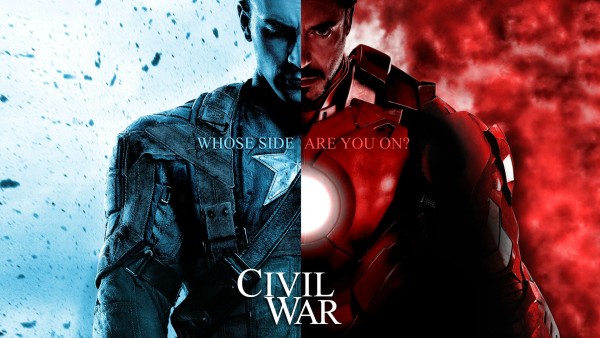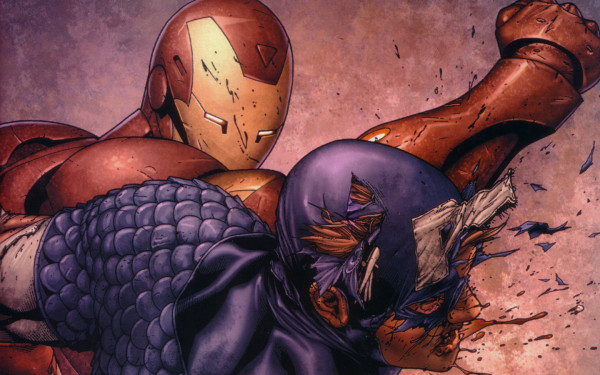One thing I have always enjoyed about pop culture is how it can express lofty ideals in unique, accessible ways. Several books and movies have helped shape my world-view, and several others have at least helped me understand things I otherwise would not have known. This week I want to take a look at Marvel’s epic crossover event Civil War, and how two opposing ethical views help shape the conflict that arises between Captain America and Iron Man.
Since this post was originally way too long, I decided to break it into two sections so you would actually have time to read it. In this first section, we will look at how the philosophy of utilitarianism fits in perfectly with Iron Man’s decisions in Civil War. Tomorrow we will see how Captain America’s deontological outlook colors the decisions he makes. But first, let’s look at a brief synopsis of Civil War.
Please note: this synopsis does not include any major spoilers.
Civil War centers on the events surrounding the implementation of the Superhuman Registration Act (SRA). After a group of young, rash superheroes (who happen to star in a reality TV show) attempt to apprehend a group of supervillains goes horribly wrong, and an elementary school is destroyed, public outcry leads the US government to pass a bill requiring all super-powered individuals to register their secret identities and powers with the government and act as a sort of super police force.
The pro-registration side (led by Iron Man) feels that this is a natural progression of things and it is pointless to oppose that level of public uproar. Those who oppose the bill (led by Captain America) think that this is a gross violation of their rights and will take away any chance of them being able to both use their powers for good and allow them to live a normal life/protect their loved ones. The tension between the two groups eventually escalates into full-blown battle as Iron Man’s forces attempt to apprehend those who oppose the SRA, and Captain America and his Secret Avengers are trying to both carry on with their heroic activities and counter Iron Man’s attacks.
As the fight wages on, Iron Man obtains funds from Congress to build a giant prison in the Negative Zone. The purpose of this prison is to indefinitely house those superheroes that refuse to register without trial. This leads to an escalation in the conflict, which in turn leads to a no holds barred fight between the two sides.
Now that we have an extremely brief, mostly spoiler-free synopsis of Civil War I want to look at the two philosophies that I think best represent both sides. By understanding these two different ethical outlooks we might better understand why each side thinks they are making a moral choice. First up: Utilitarianism!
There are several different variations of utilitarianism but generally speaking, utilitarians believe that no action or choice is inherently right or wrong. Instead, what makes a particular action right or wrong is judged by the amount of good (e.g. happiness, pleasure, satisfaction, etc.) it brings to the greatest number of people. To make it even simpler, the end justifies the means. When we first looked at utilitarianism, we saw how from a purely utilitarian point of view Lando Calrissian’s betrayal of Han Solo could have been considered a just decision. Utilitarianism would also be the ethical philosophy used to justify Tony Stark’s actions in Civil War.
We see hints at Tony’s utilitarian outlook in the move Avengers: Age of Ultron as well. Tony believes that using artificial intelligence will eventually lead to the greatest amount of good/happiness for the greatest amount of people. He is so set and so focused on this being the moral choice that he ignores the other Avengers and develops the technology in secret ultimately leading to Ultron, an enemy set on eradicating the human race. Obviously, this was an unforeseen consequence, but that’s kind of the thing — it’s impossible to know all of the potential outcomes of a particular decision. Perhaps the real problem of utilitarianism, at least when it comes to Tony and Civil War, is that the calculation of the greatest good for the greatest number is subject to the person working the equation. Tony is a narcissist, which inherently leads to narcissistic utilitarianism, meaning he might not see the greatest good the same way someone with a different starting point would.
The greatest good for the greatest number sounds pretty great in theory, but (like Communism) there are definitely some flaws with this philosophical stance, and these deficiencies are clearly seen in real life and in the story of Civil War. For instance, utilitarianism could be used to justify the slavery of a small group because it could bring happiness and economic stability to a greater number; or it could be used to justify imprisoning superheroes in the Negative Zone without a trial. Both of these actions (especially the one that actually exists in the real world) would be considered wrong by most, but could be justified using a utilitarian point of view.
Now that we have taken a look at Tony’s particular brand of narcissistic utilitarianism, I hope you have a better understanding of why Tony thought what he was doing was necessary in order to maximize utility. Tony was trying to make right a lot of wrongs and thought that by reining in powerful heroes he could bring happiness and security to the greatest number of people. If you liked this entry, be sure to come back for part 2 to find out more about deontology and Captain America’s anti-SRA stance!


